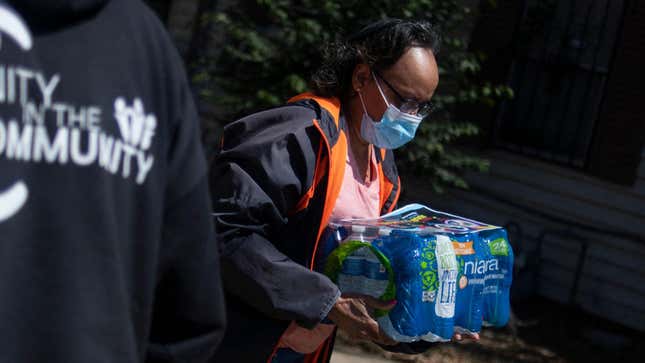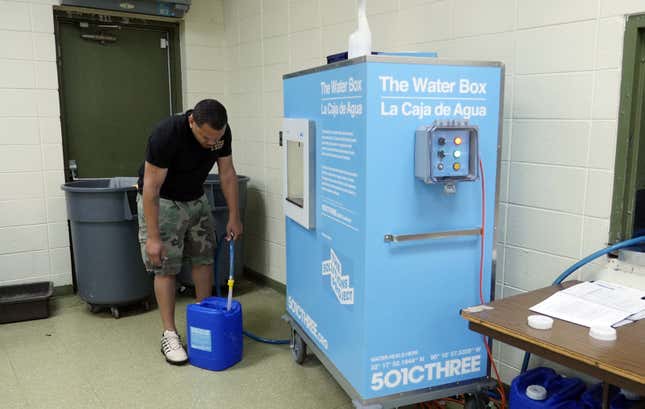In Mississippi’s Water Crisis, Formerly Incarcerated Women Left to ‘Fend for Ourselves’
"People are not coming to save us first. We are at the last of everything.”
NewsPolitics

The water system is failing in Jackson, Mississippi, leaving up to 180,000 people—the vast majority of whom are Black—without access to safe drinking water. They are being told to boil any water they use for three minutes and to conserve what limited water supply they have. The National Guard has been deployed to distribute supplies, as stores sell out of bottled water. All public schools have switched to virtual learning, lacking the water pressure needed to flush their own toilets.
On Monday, two houses for formerly incarcerated women in Jackson lost access to water, while a third house is down to very low water pressure, Pauline Rogers, co-founder of the Reaching and Education for Community Hope (RECH) foundation, told Jezebel. Rogers and her husband Frederick are both formerly incarcerated and started the RECH Foundation in 1987 to house women coming out of prison and offer work opportunities to people impacted by incarceration. Not having access to water is exponentially more difficult for the community she serves.
“They’re already strapped for resources, they don’t have the transportation to go get resources that may be readily available,” she said. Many people she helps are homeless and can’t fill up tubs to store water. Often, if they get water handed out to them, she said, they are accused of stealing it.
When Jackson’s water pressure dipped, the women living in the RECH houses “immediately knew to collect as much water as they could,” Rogers said. At one of the houses, they began using a giant barrel to store water, and they are also storing water in recycled Clorox containers. When I asked if Rogers was worried about the dangers of storing water in bleach containers, she said they mainly are using that water for flushing, but in the event of an emergency, they would boil it and drink it if necessary.
“I grew up in the country, but we’ve learned to do that in the city because of the ongoing water crisis,” she said. “It’s not what we want to do, it’s what we’ve been forced to do.”

Mississippi’s capital and largest city is 82 percent Black and has been living with a water crisis for years. Residents spent much of the last month under boil water advisories. Now, the water issue is life-threatening. Governor Tate Reeves (R) addressed the city in an emergency briefing on Monday: “Do not drink the water. In too many cases, it is raw water from the reservoir being pushed through the pipes,” he said. “This is a very different situation from a boil water notice. Until it is fixed, we do not have reliable running water at scale. The city cannot produce enough water to fight fires, to flush toilets, and to meet other critical needs.”
Recent flooding from the Pearl River has worsened an already devastating situation in Jackson. Reeves said he found out last Friday that the city’s water treatment plant was in danger of completely failing and that Jackson could be in a scenario “without running water for an extended period,” which would begin within the next few weeks or months “if something didn’t materially improve.” Already, there are reports of thousands of people with little to no water pressure, much like the women at the RECH homes.
In addition to the residents from three RECH houses sharing one house’s low water pressure, earlier on Tuesday Frederick invited three of the organization’s volunteers to use their shower. “We cover ourselves,” Rogers said. “Water is a necessity for us all. You can’t leave anybody behind in a crisis.”
However, in her foundation’s line of work, being left behind is a daily ordeal, with formerly incarcerated people suffering “ongoing unforgiveness” from those who feel like they are deserving of constant punishment, Rogers said. “With this population, we have learned from the past decade we have to fend for ourselves. People are not coming to save us first. We are at the last of everything.”
Last year the Mississippi Free Press’s Nick Judin did a three-part investigation series on Jackson’s ongoing water crisis, and the nonprofit’s founding editor argued in an op-ed for NBC News that the city’s problem stemmed from racism in the state legislature. Last week, Jackson mayor Chokwe Antar Lumumba said his city would likely need $200 million to fix its water system. AP reports that the entire state only has $75 million on tap to fix water problems this year.